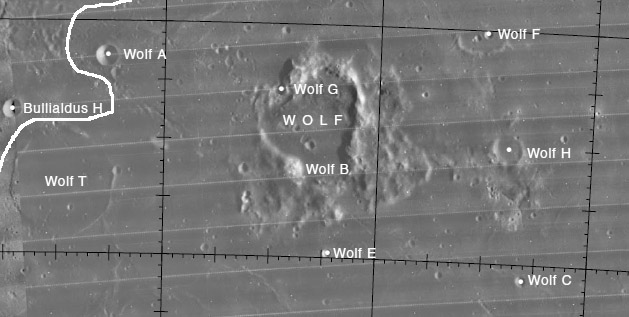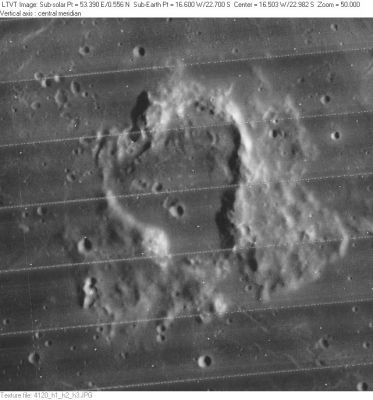Difference between revisions of "Wolf"
| Line 6: | Line 6: | ||
|} | |} | ||
<div id="toc"> | <div id="toc"> | ||
| − | + | [http://www.lpod.org/coppermine/albums/userpics/Wolf_LO_IV-120H_LTVT.JPG [[Image:normal_Wolf_LO_IV-120H_LTVT.JPG|external image normal_Wolf_LO_IV-120H_LTVT.JPG]]]<br /> ''[http://lpod.org/coppermine/displayimage.php?pos=-2721 LO_IV-120H]'' The [http://the-moon.us/wiki/IAU IAU]'s '''Wolf''' is the upper-central part of this complex enclosure 47 km south of the center of [http://the-moon.us/wiki/Mare%20Nubium Mare Nubium]. The bay where the gulf between east and west ridges widens in the south is regarded by the IAU as a superimposed 17-km crater ('''Wolf B'''); while part of the shadow-casting area in the northeast is regarded as 7-km '''Wolf G''', lying completely within the outline of the main named crater. The crisp 2-km circular crater at bottom center is '''Wolf E'''.<br /> <br /> | |
| − | |||
==Images== | ==Images== | ||
[http://www.lpod.org/coppermine/thumbnails.php?album=search&type=full&search=Wolf LPOD Photo Gallery] [http://www.lpi.usra.edu/resources/lunar_orbiter/bin/srch_nam.shtml?Wolf%7C0 Lunar Orbiter Images] [http://www.lpi.usra.edu/resources/apollo/search/feature/?feature=Wolf Apollo Images]<br /> - Although the name '''Wolf''' is not mentioned in the LPI's search-list of orbital Apollo photographs ('''Wolf''' should not be confused with [http://the-moon.us/wiki/Wolff%2C%20Mt. Mons Wolff] in the Apennine mountains!), it ('''Wolf''' at '''Mare Nubium''') WAS photographed during the mission of Apollo 16 in april 1972. '''Wolf''' is noticeable just "above" (north of) the central and lowest part of the curved horizon in the oblique south-looking metric/mapping ''Fairchild''-camera photograph [http://wms.lroc.asu.edu/apollo/view?image_id=AS16-M-2489 AS16-M-2489] (zoom-able HiRes scan of the ASU's ''Apollo Image Archive'').<br /> Research: Danny Caes<br /> <br /> | [http://www.lpod.org/coppermine/thumbnails.php?album=search&type=full&search=Wolf LPOD Photo Gallery] [http://www.lpi.usra.edu/resources/lunar_orbiter/bin/srch_nam.shtml?Wolf%7C0 Lunar Orbiter Images] [http://www.lpi.usra.edu/resources/apollo/search/feature/?feature=Wolf Apollo Images]<br /> - Although the name '''Wolf''' is not mentioned in the LPI's search-list of orbital Apollo photographs ('''Wolf''' should not be confused with [http://the-moon.us/wiki/Wolff%2C%20Mt. Mons Wolff] in the Apennine mountains!), it ('''Wolf''' at '''Mare Nubium''') WAS photographed during the mission of Apollo 16 in april 1972. '''Wolf''' is noticeable just "above" (north of) the central and lowest part of the curved horizon in the oblique south-looking metric/mapping ''Fairchild''-camera photograph [http://wms.lroc.asu.edu/apollo/view?image_id=AS16-M-2489 AS16-M-2489] (zoom-able HiRes scan of the ASU's ''Apollo Image Archive'').<br /> Research: Danny Caes<br /> <br /> | ||
| Line 22: | Line 21: | ||
* Cherrington, 1969: 0.7 km | * Cherrington, 1969: 0.7 km | ||
| − | * From the shadows in LO-IV-120H, the east wall of '''Wolf'''/'''Wolf B''' rises up to 500-900 m. <span class="membersnap">- | + | * From the shadows in LO-IV-120H, the east wall of '''Wolf'''/'''Wolf B''' rises up to 500-900 m. <span class="membersnap">- Jim Mosher</span> |
<br /> | <br /> | ||
==Nomenclature== | ==Nomenclature== | ||
Maxmilian Franz Joseph Cornelius; German astronomer (1863-1932).<br /> | Maxmilian Franz Joseph Cornelius; German astronomer (1863-1932).<br /> | ||
| − | * According to ''[http://the-moon.us/wiki/Whitaker Whitaker]'' (p. 226), this name was introduced by [http://the-moon.us/wiki/Krieger Krieger] and [http://the-moon.us/wiki/K%C3%B6nig König]. In [http://the-moon.us/wiki/Riccioli Riccioli]'s nomenclature the same feature was known as '''Munosius''' (''[http://the-moon.us/wiki/Whitaker Whitaker]'', p. 213). <span class="membersnap">- | + | * According to ''[http://the-moon.us/wiki/Whitaker Whitaker]'' (p. 226), this name was introduced by [http://the-moon.us/wiki/Krieger Krieger] and [http://the-moon.us/wiki/K%C3%B6nig König]. In [http://the-moon.us/wiki/Riccioli Riccioli]'s nomenclature the same feature was known as '''Munosius''' (''[http://the-moon.us/wiki/Whitaker Whitaker]'', p. 213). <span class="membersnap">- Jim Mosher</span> |
* On page 196 of Whitaker's Appendix D, Van Langren called this crater '''Robervalis'''. | * On page 196 of Whitaker's Appendix D, Van Langren called this crater '''Robervalis'''. | ||
| − | * Known as '''Max Wolf''' on Hans Schwarzenbach's moonmap of ''HALLWAG''.<span class="membersnap">- | + | * Known as '''Max Wolf''' on Hans Schwarzenbach's moonmap of ''HALLWAG''.<span class="membersnap">- DannyCaes <small>Oct 28, 2012</small></span> |
* It's interesting to know that there was also the French astronomer [http://en.wikipedia.org/wiki/Charles_Wolf_(astronomer) Charles Joseph Etienne Wolf] (1827-1918). | * It's interesting to know that there was also the French astronomer [http://en.wikipedia.org/wiki/Charles_Wolf_(astronomer) Charles Joseph Etienne Wolf] (1827-1918). | ||
* And also [https://en.wikipedia.org/wiki/Rudolf_Wolf Johann Rudolf Wolf] (1816-1893, Swiss astronomer and mathematician, best known for his research on sunspots) (the Wolf number). | * And also [https://en.wikipedia.org/wiki/Rudolf_Wolf Johann Rudolf Wolf] (1816-1893, Swiss astronomer and mathematician, best known for his research on sunspots) (the Wolf number). | ||
| Line 42: | Line 41: | ||
Was the director of the observatory at Zurich '''Max Wolf''' or '''Charles Wolf?''' (see article '''On Luminous Matter in the Atmosphere''' by Henry Waldner, ''Nature'', 1872), page 275 in ''Mysterious Universe, a handbook of astronomical anomalies'' (William R. Corliss, ''The Sourcebook Project'', 1979).<br /> <br /> <br /> | Was the director of the observatory at Zurich '''Max Wolf''' or '''Charles Wolf?''' (see article '''On Luminous Matter in the Atmosphere''' by Henry Waldner, ''Nature'', 1872), page 275 in ''Mysterious Universe, a handbook of astronomical anomalies'' (William R. Corliss, ''The Sourcebook Project'', 1979).<br /> <br /> <br /> | ||
---- | ---- | ||
| − | + | </div> | |
Revision as of 16:58, 15 April 2018
Contents
Wolf
|
Lat: 22.7°S, Long: 16.6°W, Diam: 25 km, Depth: 0.79 km, Rükl: 54 |
LO_IV-120H The IAU's Wolf is the upper-central part of this complex enclosure 47 km south of the center of Mare Nubium. The bay where the gulf between east and west ridges widens in the south is regarded by the IAU as a superimposed 17-km crater (Wolf B); while part of the shadow-casting area in the northeast is regarded as 7-km Wolf G, lying completely within the outline of the main named crater. The crisp 2-km circular crater at bottom center is Wolf E.
Images
LPOD Photo Gallery Lunar Orbiter Images Apollo Images
- Although the name Wolf is not mentioned in the LPI's search-list of orbital Apollo photographs (Wolf should not be confused with Mons Wolff in the Apennine mountains!), it (Wolf at Mare Nubium) WAS photographed during the mission of Apollo 16 in april 1972. Wolf is noticeable just "above" (north of) the central and lowest part of the curved horizon in the oblique south-looking metric/mapping Fairchild-camera photograph AS16-M-2489 (zoom-able HiRes scan of the ASU's Apollo Image Archive).
Research: Danny Caes
Maps
(LAC zone 94B4) LAC map Geologic map
Description
Description: Wikipedia
Additional Information
Depth data from Kurt Fisher database
- Arthur, 1974: 0.79 km
- Westfall, 2000: 0.79 km
- Cherrington, 1969: 0.7 km
- From the shadows in LO-IV-120H, the east wall of Wolf/Wolf B rises up to 500-900 m. - Jim Mosher
Nomenclature
Maxmilian Franz Joseph Cornelius; German astronomer (1863-1932).
- According to Whitaker (p. 226), this name was introduced by Krieger and König. In Riccioli's nomenclature the same feature was known as Munosius (Whitaker, p. 213). - Jim Mosher
- On page 196 of Whitaker's Appendix D, Van Langren called this crater Robervalis.
- Known as Max Wolf on Hans Schwarzenbach's moonmap of HALLWAG.- DannyCaes Oct 28, 2012
- It's interesting to know that there was also the French astronomer Charles Joseph Etienne Wolf (1827-1918).
- And also Johann Rudolf Wolf (1816-1893, Swiss astronomer and mathematician, best known for his research on sunspots) (the Wolf number).
Lettered Craters

Excerpt from the USGS Digital Atlas of the Moon.
LPOD Articles
Bibliography
Dr. Wolf: Max Wolf or Charles Wolf?
Was the director of the observatory at Zurich Max Wolf or Charles Wolf? (see article On Luminous Matter in the Atmosphere by Henry Waldner, Nature, 1872), page 275 in Mysterious Universe, a handbook of astronomical anomalies (William R. Corliss, The Sourcebook Project, 1979).
